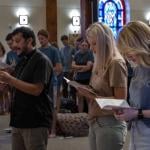The first half of Acts belongs to Peter. His story climaxes in Acts 10-12, where he presides over the “Gentile Pentecost” that brings Cornelius and his household into the kingdom, is arrested and miraculously released and then departs. He reappears briefly, but for the most part his story in Acts is over. The second half of the book belongs to Paul. Luke wrote a “to the Jew first, and also to the Greeks” account of the early church. Fittingly, Peter’s... Read more




















